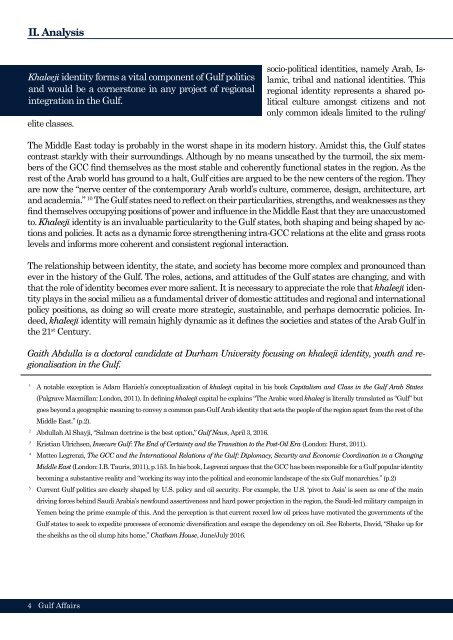You also want an ePaper? Increase the reach of your titles
YUMPU automatically turns print PDFs into web optimized ePapers that Google loves.
II. Analysis<br />
Khaleeji identity forms a vital component of Gulf politics<br />
and would be a cornerstone in any project of regional<br />
integration in the Gulf.<br />
elite classes.<br />
socio-political identities, namely Arab, Islamic,<br />
tribal and national identities. This<br />
regional identity represents a shared political<br />
culture amongst citizens and not<br />
only common ideals limited to the ruling/<br />
The Middle East today is probably in the worst shape in its modern history. Amidst this, the Gulf states<br />
contrast starkly with their surroundings. Although by no means unscathed by the turmoil, the six members<br />
of the GCC find themselves as the most stable and coherently functional states in the region. As the<br />
rest of the Arab world has ground to a halt, Gulf cities are argued to be the new centers of the region. They<br />
are now the “nerve center of the contemporary Arab world’s culture, commerce, design, architecture, art<br />
and academia.” 10 The Gulf states need to reflect on their particularities, strengths, and weaknesses as they<br />
find themselves occupying positions of power and influence in the Middle East that they are unaccustomed<br />
to. Khaleeji identity is an invaluable particularity to the Gulf states, both shaping and being shaped by actions<br />
and policies. It acts as a dynamic force strengthening intra-GCC relations at the elite and grass roots<br />
levels and informs more coherent and consistent regional interaction.<br />
The relationship between identity, the state, and society has become more complex and pronounced than<br />
ever in the history of the Gulf. The roles, actions, and attitudes of the Gulf states are changing, and with<br />
that the role of identity becomes ever more salient. It is necessary to appreciate the role that khaleeji identity<br />
plays in the social milieu as a fundamental driver of domestic attitudes and regional and international<br />
policy positions, as doing so will create more strategic, sustainable, and perhaps democratic policies. Indeed,<br />
khaleeji identity will remain highly dynamic as it defines the societies and states of the Arab Gulf in<br />
the 21 st Century.<br />
Gaith Abdulla is a doctoral candidate at Durham University focusing on khaleeji identity, youth and regionalisation<br />
in the Gulf.<br />
1<br />
2<br />
3<br />
4<br />
5<br />
A notable exception is Adam Hanieh’s conceptualization of khaleeji capital in his book Capitalism and Class in the Gulf Arab States<br />
(Palgrave Macmillan: London, 2011). In defining khaleeji capital he explains “The Arabic word khaleej is literally translated as “Gulf” but<br />
goes beyond a geographic meaning to convey a common pan-Gulf Arab identity that sets the people of the region apart from the rest of the<br />
Middle East.” (p.2).<br />
Abdullah Al Shayji, “Salman doctrine is the best option,” Gulf News, April 3, 2016.<br />
Kristian Ulrichsen, Insecure Gulf: The End of Certainty and the Transition to the Post-Oil Era (London: Hurst, 2011).<br />
Matteo Legrenzi, The GCC and the International Relations of the Gulf: Diplomacy, Security and Economic Coordination in a Changing<br />
Middle East (London: I.B. Tauris, 2011), p.153. In his book, Legrenzi argues that the GCC has been responsible for a Gulf popular identity<br />
becoming a substantive reality and “working its way into the political and economic landscape of the six Gulf monarchies.” (p.2)<br />
Current Gulf politics are clearly shaped by U.S. policy and oil security. For example, the U.S. ‘pivot to Asia’ is seen as one of the main<br />
driving forces behind Saudi Arabia’s newfound assertiveness and hard power projection in the region, the Saudi-led military campaign in<br />
Yemen being the prime example of this. And the perception is that current record low oil prices have motivated the governments of the<br />
Gulf states to seek to expedite processes of economic diversification and escape the dependency on oil. See Roberts, David, “Shake up for<br />
the sheikhs as the oil slump hits home,” Chatham House, June/July 2016.<br />
4 Gulf Affairs


